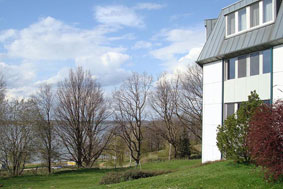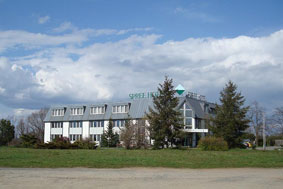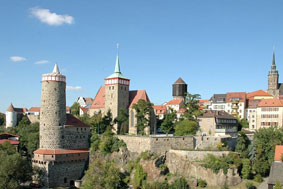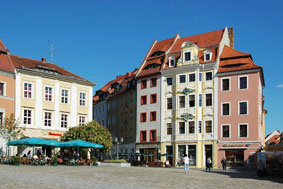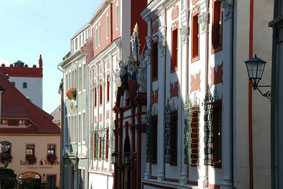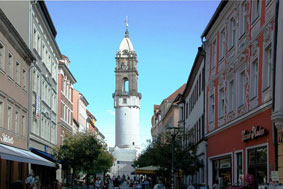|
|
The 2009 European School of High-Energy Physics
| 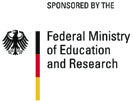
|
|
|
Bautzen, Germany
14 June – 27 June 2009
|
|---|
The 2009 European School of High-Energy Physics (formerly the CERN-JINR School of Physics) is jointly organized by the European Organization for Nuclear Research (CERN), Geneva, Switzerland and the Joint Institute for Nuclear Research (JINR), Dubna, Russia, with support from the Federal Ministry of Education and Research, Germany, the Max Planck Institute for Physics, Germany and the Physics at the Terascale, Helmholtz Alliance, Germany.
The European School of High-Energy Physics is targetted particularly at students in experimental HEP who are in the final years of work towards their PhDs. Other schools, such as the CERN-FNAL Hadron Collider School may provide more appropriate training for young postdocs in experimental HEP, PhD students who have already attended the European school, and senior PhD students in HEP phenomenology.
The Schools of Physics are designed to give a survey of up-to-date information, rather than to be a training course. An outline of each of the lecture courses and reading lists will be published on the web. It should be noted that some pre-knowledge of the subjects is necessary in order to be able to profit fully from the lecture courses. Preference will be given to students who have connections with CERN and JINR member states either because of their nationality, or because of their institutional affiliation, or because they are involved in an experimental programme at a laboratory located in one of the member states.
Poster (255 kB)
 Date and Place of the School Date and Place of the School |
 |
The 17-th European School of High-Energy Physics will be held from 14 to 27 June, 2009 in Bautzen. The lectures and discussion sessions will all take place in the Spree Hotel, using the hotel's conference facilities.
The hotel is located 4 km outside the historical center of Bautzen on the banks of the lake Stausee which is flushed through by the River Spree. That lake is also known as the Bautzen reservoir, and it is one of the best-studied river-lake systems worldwide. The almost 1000 year-old Bautzen town is situated 80 km north-east from Dresden, Saxony.
Bautzen is often regarded as the unofficial, but historical capital of Upper Lusatia an historical region between the Bóbr and Kwisa rivers and the Elbe river in the eastern German states of Saxony and Brandenburg, south-western Poland and the northern Czech Republic. It is the most important cultural center of the Sorbs, a Slavic minority.
 Accommodation
Accommodation
|  |
|---|
The students, faculty and staff of the School will be lodged in Spree Hotel Bautzen where also breakfast, lunch and dinner will be served. Students will share twin rooms each of which has its own bathroom.
The lecture hall and the rooms for the discussion sessions are also situated in the hotel, which will be equipped with computing and electronic communication facilities. All the meals will be served in the nice dining room of the Hotel.
 Scientific Programme
Scientific Programme
|  |
|---|
The detailed scientific programme is given in the Time table
| Field Theory and Standard Model |
Wolfgang Hollik, MPP, Munich |
| QCD |
Gavin Salam, LPTHE, Paris |
| Flavour Physics and CP Violation |
Yuval Grossman, Cornell University |
| Effective Field Theories with Applications |
Martin Beneke, RWTH Aachen University |
| Beyond the Standard Model |
Joseph Lykken, Fermilab |
| Neutrino Physics |
Manfred Lindner, MPI, Heidelberg |
| Cosmology for Particle Physicists |
Keith Olive, University of Minnesota |
|
Quark Gluon Plasma: past, present, future |
G.M. Zinovjev, BITP, Kiev |
| High-Energy Cosmic and Gamma Rays |
Masahiro Teshima, MPP, Munich |
| Statistical Techniques for HEP Data Analysis |
Glen Cowan, Royal Holloway, Univ. of London |
| From CERN |
Rolf Heuer, CERN DG |
| from JINR |
Alexei Sissakian, JINR DG |
There will be 32 lectures in all, each lasting about 75 minutes,
with additional time for questions and discussion.
Students will be encouraged to present their current research work in the form of a special poster session which is planned for Thursday, June 18.
 Discussion Sessions
Discussion Sessions
|  |
|---|
Discussion sessions, which are intended to clarify points that may be obscure from the lectures, will be held most afternoons and will last about 75 minutes.
The discussion sessions will be led by:
| Tobias Huber |
RWTH Aachen University |
| Alexander Mück |
PSI, Villigen |
| Dmitry Naumov |
JINR, Dubna |
| Maria Savina |
JINR, Dubna |
| Andreas Weiler |
CERN, Geneva |
| Jure Zupan |
CERN, Geneva |
 Language
Language
|  |
|---|
The working language of the School will be English. Participants must therefore have a good understanding of English to enable them to benefit from the School.
 Proceedings
Proceedings
|  |
|---|
The School Proceedings will be published as a CERN Yellow Report in 2010. Each participant will receive one copy free of charge. Proceedings from earlier schools are available: 2006, 2005 , 2004 and 2003.
 Travel
Travel
|  |
|---|
Students should arrange to arrive in Bautzen for registration during the afternoon or evening of Sunday, June 14. The school will end on the morning of Saturday, June 27, after breakfast.
The nearest international airports are Dresden-Klotzsche (50 km), Berlin (220 km) and Prague (190 km).
There is a railway station in Bautzen. Information about trains in Germany will be given later.
More and up-to-date information about train/bus schedules, pick-up service, etc. will be posted at this web page in an upcoming announcement.
 Cost
Cost
| 
|
The cost of the School will be around 1800 Swiss Francs per student, and will cover tuition, board and lodging from dinner on Sunday June 14 to breakfast on Saturday June 27, 2009, as well as coffee, tea or cold drinks during the morning and afternoon breaks and some social activities. It does not include travel expenses from participants' home institutes to Bautzen and back.
For participants from some JINR Member States there may be special arrangements for paying the School Fee and for travel. For further information, please contact the JINR Organizing Secretary, Mrs. T.S. Donskova (see Enquires and Correspondence below).
Details concerning the method of payment of the fee will be sent together with the acceptance letters.
 Participation Participation
| 
|
The School is open to young physicists, preparing a PhD or equivalent in high-energy physics, with at least one year's experience working as experimentalists or phenomenologists. The number of students will be about 100, mostly from the CERN and JINR Member States, but a few may come from other countries which are not members. Personal contacts and informal discussions among the participants during leisure time are an important aspect of the School. For this reason, participants are asked to note that they should not be accompanied by family members or friends.
A small number of German students, who would normally not qualify for the school could be accepted as "listeners", and such students should also fill in the application form.
 Application
Application
| 
|
Applications to attend the School should include:
- a completed application form
- a letter of reference and ranking from the candidate's professor or supervisor
|
For the Application Form remember to fill in ALL fields: use "N/A" when "Not Applicable".
APPLICATION FORM
APPLICATION DEADLINE
(changed to) 25 February.
The application form for the 2009 European School of Physics should be completed and sent as soon as possible and must be received by the closing date of 25 February.
A 100-word summary of your current work should be sent by completing the appropriate section in the Web application form. This will be taken into consideration in the selection process
The submission of the completed application form must be accompanied in parallel by a letter of reference
and ranking from the student's professor or supervisor (signed and dated hard copy with letterhead of referee's institution).
Applications without a reference letter will not be considered.
The professor or supervisor's name and the date of the reference letter should be indicated in the appropriate boxes
on the Web application form; and the letter should be sent to Danielle Métral, the CERN Organizing Secretary
(see Enquiries and Correspondence below).
Students who wish to apply but who do not have a suitable browser for the Web application form should request
a hard copy of the form from one of the Organizing Secretaries (see Enquiries and Correspondence),
stating clearly their name and postal address. Their 100-word summary of current work should be sent by electronic mail
to the CERN Organizing Secretary.
Candidates should ensure that their application, letter of reference and 100-word summary reach the CERN Organizing Secretary by
(changed to) 25 February, 2009.
The selection of the students will be made by the International Organizing Committee together with the local director; and all applicants will be informed early in March whether or not they have been selected.
|
|
 Organizing Committee
Organizing Committee
| 
|
T. Donskova (JINR) School Secretary
N. Ellis (CERN)
R. Fleischer (CERN)
E. Lillestol (CERN and University of Bergen) CERN Schools Director
D. Métral (CERN) School Administrator
A. Olchevsky (JINR)
Local Organizing Committee:
S. Bethke, MPP, Munich - Local Director
G. Hiller, University of Dortmund
M. Krämer, RWTH Aachen University
K. Mönig, DESY
T. Müller, University of Karlsruhe
R. Rückl, University of Würzburg
International Advisors:
A. Sissakian (JINR, Dubna, Russia)
A. Skrinsky (BINP, Novosibirsk, Russia)
N. Tyurin (IHEP, Protvino, Russia)
 Enquiries and Correspondence
Enquiries and Correspondence
| 
|
All enquiries and correspondence related to the School of Physics
should be addressed to one of the Organizing Secretaries:
Danielle Métral
Schools of Physics
CERN/DSU
CH-1211 GENEVA 23
Switzerland |
Tatyana Donskova
International Department
Joint Institute for Nuclear Research
RU-141980 Dubna, Moscow Region
Russia |
| Tel: +41 22 767 9141 |
Tel: +7 49621 63448 |
| Fax: +41 22 767 5460 |
Fax: +7 49621 65599 |
| E-mail: physics.school@cern.ch |
E-mail: phs@jinr.ru |




